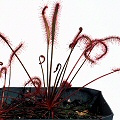Q: Do you have any suggestions for my science project?

Dionaea muscipula
A: I often get mail from students and teachers who are involved in school science
projects. The experiment is usually to see what foods Venus flytraps prefer
(the list of candidate foods I have been told about
includes hamburger meat, chicken, insects in various stages of death,
"junk" foods, vegetarian diets,
cat food, lemonade, ammonia, sand, and blood!). The sad
fact about these experiments is that since Venus flytraps are not easy to grow, all the plants in the experiment
are usually fated to die, regardless of what the experimenters pop in their traps.
Let me be clear...
When students buy carnivorous plants for feeding experiments, the details of the experiment are usually
irrelevant because the light, water, and soil
used to cultivate the plants are all wrong! Furthermore, since
Venus flytraps grow slowly, they are not good subjects
for an experiment based on only a few months' study. A far better carnivorous
plant to use in such these projects would be a
sundew. Look to the links I have for
purchasing plants--I recommend you try a plant called
Drosera capensis (Cape sundews).
These are easy to cultivate (or, at least are easier than Venus flytraps).

Drosera capensis
So, if you want to use carnivorous plants in an experiment to measure growth, and only have a few months to do it, do not use
Venus flytraps. Use rapidly growing sundews. If you want to do an experiment to see how well a plant
grows under the influence of fertilizer XXX, you will need to have at least
six months for a sundew, and about eighteen months for a Venus flytrap. Do you
have that much time? I didn't think so.
Also, you had better be dang sure you can actually grow carnivorous
plants well in the first place. Otherwise, after 3 months of experiments all your plants will
look equally miserable.
Regardless of which plant you use in your experiments, do not forget to include a
"control." This would be a plant that you did not abuse in any way. If you are doing a feeding experiment, this control
plant should be one that was not fed. (Remember that carnivorous plants can survive perfectly well without food.)
If your cultivation techniques are good, this plant should survive.
Let me very clear on this---do not ask me for suggestions on your science
experiment. I do not know the many details of your attention span, focus on details, budget, time restraints,
materials constraints, laboratory skills, or equipment.
At some point I would like to include a FAQ entry describing
different experiments students can perform for their science projects.
Unfortunately, this section will take a little bit of work to do properly. I
don't want to just hand out science experiments which would be copied blindly
by students. Until then, you will have to devise
a science experiment yourself. An experiment you devise yourself will be much
better than one you read out of a book that we have seen done over and over
again.
P.S. Yes, I know this FAQ entry is just like my FAQ page on
Venus flytrap science projects,
but I answer this question so many times via e-mail...
Page citations: None, just exasperation.